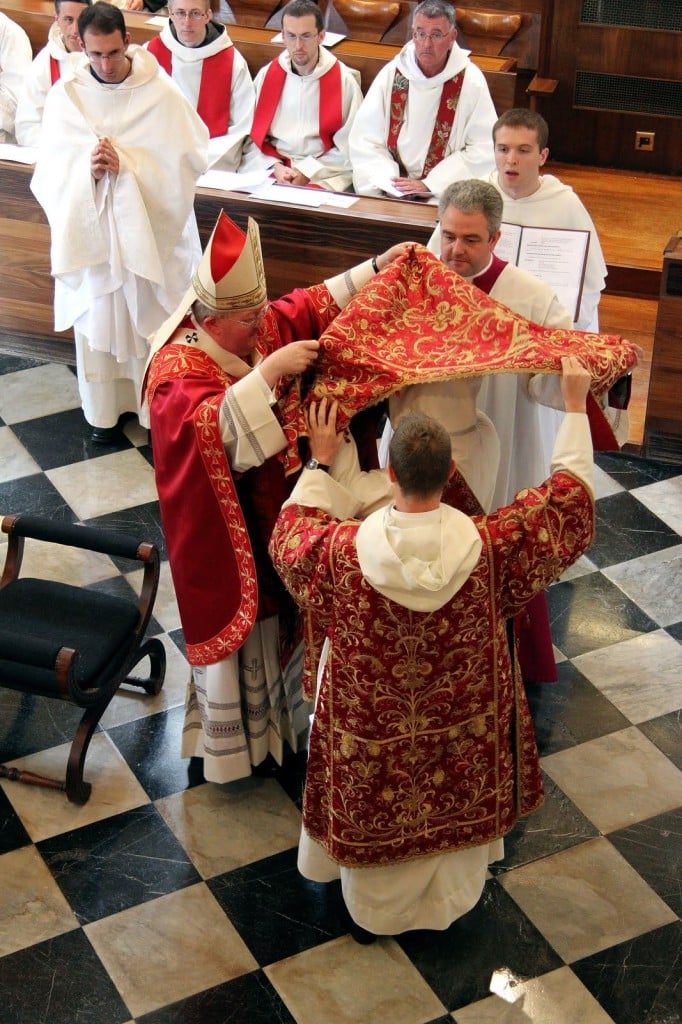The Theology of Catholic Vestments
Is there a theology of Catholic vestments? You see vestments every Sunday. So why do priests wear vestments?
Now such was the raiment of the high priest, for both it and its parts have a meaning that must not be passed over in silence. For the whole vestment is in fact a representation and copy of the cosmos, and the parts are representations of its several portions.
– Philo Judæus of Alexandria
When a couple makes reservations to dine at an elegant restaurant, they expect four things. First, they expect that an exceptional dining experience will cost more than what they typically pay at other restaurants. Second, they expect superior cuisine and exceptional wine. Third, they expect an attractive and formal environment: white tablecloths, dim lights, sophisticated artwork, appropriate music, and candlelight. Last but not least, they expect prompt and respectful service.
The prompt and respectful service depends entirely on the waiter. In part, the waiter communicates his ability to serve his guests by his attire. If a couple is willing to spend $500.00 on one dinner and a bottle of wine, they would be rightly offended if their waiter arrived at the table in jeans and a t-shirt. This is because attire matters.
Attire Matters
A survey of important human landmarks reveal that what we wear communicates our respect for an occasion: the vesture of a bride and groom on their wedding day—the clothing we wear for a funeral—the robes we wear at graduation—the attire we wear for a job interview or a first date. Whenever the occasion calls for it, we dress appropriately. A waiter at a fine restaurant wears a tuxedo for the same practical reason that a priest wears certain vestments for the Holy Sacrifice of the Mass. In each case, the clothes of the server communicate the fact that he knows the importance of the occasion, and how best to fulfill his duties. If a fine dinner presumes proper attire, how much more so the Holy Sacrifice of the Mass by which God becomes present?
Catholic Vestments and Human Nakedness
There is also a theological reason why Catholic priests wear vestments. We must remember that mankind was originally created naked. The first symptom of human sin was an awareness of nakedness:
She also gave some to her husband, and he ate. Then the eyes of both were opened, and they knew that they were naked. They sewed fig leaves together and made themselves aprons (Gen 3:6-7).
Before the Lord expelled Adam and Eve from the Garden of Eden, “He made for Adam and for his wife garments of skins, and clothed them” (Gen 3:21). God clothed Adam and Eve as a sign of His fatherly love for them. The clothes we wear bear a theological reference to our sinfulness.
Everyone wears clothes for certain events. Therefore, it is fitting that when a man represents God, as in the case of a priest, he wears clothing to reveal this mystery. The priests of the Old Covenant were commanded by God to wear special garments when they served in the presence of the Lord. These vestments were signs to denote the sacred calling of the priest, but even more, the vestments reminded the priest that he stood in the presence of the thrice-holy God.
The Old Covenant vestments were prescribed by direct revelation and pertained to the Old Covenant hierarchy of the High Priest, the Priests, and the Levites. The vestments of the New Covenant remind us and the priest that the priest is acting in persona Christi–in the person of Christ. The Eucharistic liturgy calls for special clothes for this special context. He can’t just glide up there in bermuda shorts and a t-shirt. Holiness calls for set-apart, sanctified clothing.
[reminder]Is there anything in particular that you would like me to cover about vestments? Should we lay people provide beautiful vestments (or cheap polyester versions) for our clergy? How can we do this?[/reminder]
What to Watch Next
SHOP THE TAYLOR MARSHALL STORE
Dive Deeper

GET CONFIDENT IN YOUR FAITH
Explore the fascinating world of Catholic teachings with Dr. Marshall. Together you’ll unpack the brilliant answers the Church gives to tough questions about the Faith. The best part: you go at your own pace. Start this exciting journey today.


 >
>




